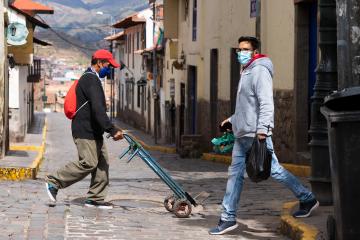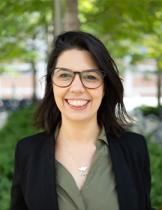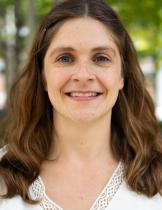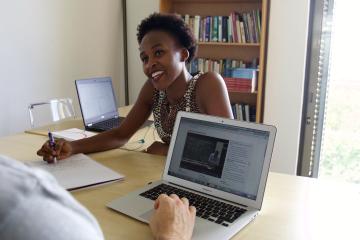
J-PAL LAC welcomes the most diverse cohort yet to its impact evaluation Diploma program
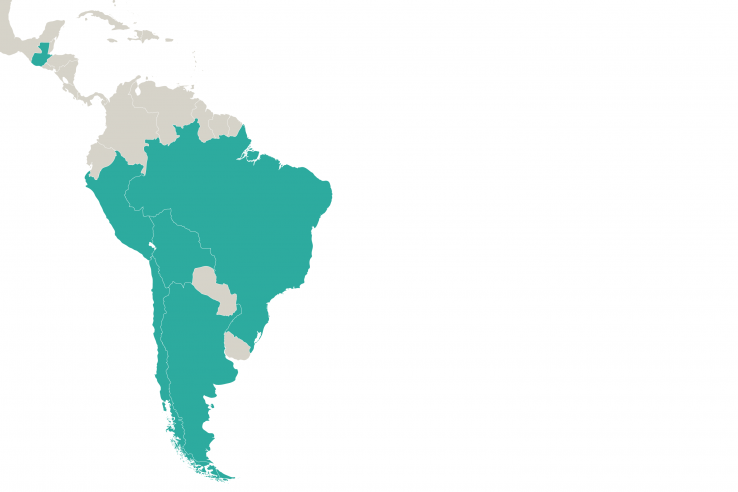
A core focus at J-PAL is building the capacity of researchers to produce evidence and practitioners, policymakers and donors to use it. Launched in 2016, the Spanish-language Diploma in Impact Evaluation of Public Policy and Social Programs is a collaborative effort between the Pontificia Universidad Católica de Chile (UC Chile) and J-PAL Latin America and the Caribbean (J-PAL LAC) to provide students with a deep dive into the theory and practice of impact evaluations and equip them to design and apply them, and become advocates of evidence-informed policy.
J-PAL LAC is glad to welcome its fifth and most diverse Diploma cohort. Over six months, 32 students from six countries from LAC and 28 organizations will engage in over 100 hours of classes and conversations with J-PAL affiliates (Francisco Gallego, Jeanne Lafortune, and Claudia Martínez), UC Chile professors (Tomás Rau), J-PAL LAC staff, and J-PAL LAC’s former executive director and current leader of the Experimental Policy Initiative within Chile's Budget Office, Ryan Cooper. By the end of the course, participants will know how to understand, design, and implement impact evaluations. The training includes three courses and a project where students develop a real-life impact evaluation strategy, often connected to their work.
Greater diversity in the classroom
The fifth edition of the Diploma brings two new innovations. First, although the Covid-19 crisis has presented many personal and professional challenges, it encouraged us to re-think the format of the Diploma. For the first time, classes are being implemented exclusively online. In contrast to previous in-person editions, the online modality allowed participants outside of Santiago of Chile to be part of and engage in this training more easily.
Second, generous support from Fundación Colunga, Fundación Olivo, Fundación Mustakis, and Fundación San Carlos de Maipo allowed J-PAL LAC and UC Chile to provide scholarships for more than one-third of the cohort. Together, these two factors allow for greater diversity in the classroom, one of J-PAL LAC's core values.
The scholarships also enabled professionals from grassroots organizations, working to solve the most pressing socioeconomic challenges in the region, to enroll. Foundation sponsors approached the organizations with which they work and offered partial scholarships to staff whose work would directly benefit from participation in the Diploma, and who met the academic requirements. Students who made the cut work at Padre Semería, Simón de Cirene, Súmate, Trabün, Comunidad Mujer, Corporación Formando Chile, Comunidad de Organizaciones Solidarias, Recrea, Fundación Mujer Levántate, Fundación Infancia Primero, and Fundación 99, on topics such as increasing social integration, education, early childhood development, gender, and entrepreneurship.
This is critical, since, as Arturo Celedón, the Executive Director of Fundación Colunga mentions, it is hard for professionals from civil society organizations to access first-level training. Patricia Matte, Founder and President of Fundación Olivo, explains:
“The programs implemented by NGOs have a big challenge related to responding effectively to the problems for which they were designed. In Olivo we believe it is essential to strengthen the abilities of organizations to generate evidence on the effectiveness of their programs and highlight the relevance of evidence-based approaches, as part of the intervention and advocacy processes. Considering this, we got together a group of philanthropic foundations with the objective of enhancing the capabilities of civil society, by giving grants for the Diploma. The highly positive reaction from the beneficiaries confirms the hypothesis of the importance of evaluation in the chain to transform reality.”
The 2021 cohort is 50 percent female and is also balanced between participants with and without graduate degrees (59 percent have a graduate degree). Most students (44 percent) work for NGOs, followed by government representatives (22 percent). Most students are aged 24-35.
Compared to previous editions of the Diploma, students come from more diverse backgrounds and locations. About one-third of the students are based outside Chile, coming from Peru, Bolivia, Brazil, Argentina, and Guatemala. Additionally, one-quarter of Chilean participants come from outside of the capital, Santiago.
We are proud to offer such in-depth and high-quality training in Spanish to increase access to relevant information for Spanish-speaking policy practitioners across the continent, who may be otherwise excluded.
What's next?
We believe these changes in the Diploma can help J-PAL LAC engage with a broader audience and achieve our mission of providing quality training for all. In particular, we see value in collaborations between the public sector, private sector, and academia, as they allow us to identify talented practitioners who would otherwise not be able to enroll. In the end, as Patricio Mayr from Fundación Mustakis points out, forming professionals to conduct impact evaluations in the public and private sector is a contribution to civil society. Over the next couple of years, we hope to increase our scholarship fund so that more professionals from diverse backgrounds can learn how to design and implement rigorous evaluations.
Related Content
Diploma in Impact Evaluation of Public Policy and Social Programs

Second cohort to graduate from the Data, Economics, and Development Policy master’s program joins a growing community of alumni
